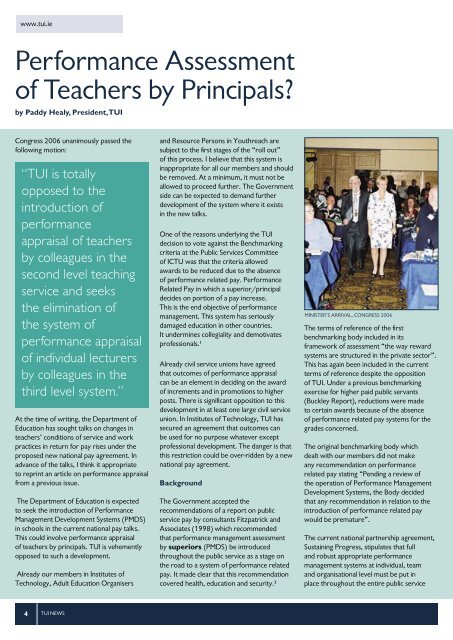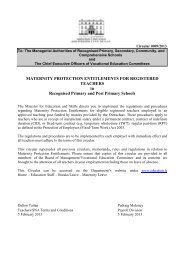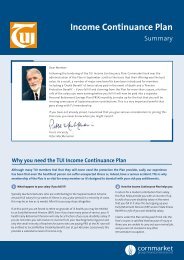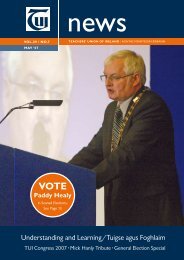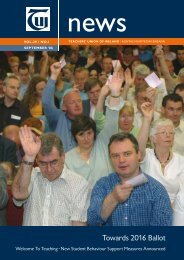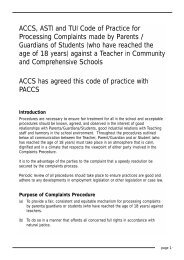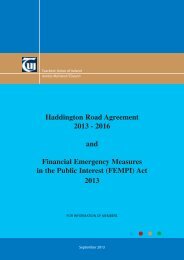Vol 28 No.6 - May 2006 - TUI
Vol 28 No.6 - May 2006 - TUI
Vol 28 No.6 - May 2006 - TUI
Create successful ePaper yourself
Turn your PDF publications into a flip-book with our unique Google optimized e-Paper software.
www.tui.iePerformance Assessmentof Teachers by Principals?by Paddy Healy, President, <strong>TUI</strong>Congress <strong>2006</strong> unanimously passed thefollowing motion:“<strong>TUI</strong> is totallyopposed to theintroduction ofperformanceappraisal of teachersby colleagues in thesecond level teachingservice and seeksthe elimination ofthe system ofperformance appraisalof individual lecturersby colleagues in thethird level system.”At the time of writing, the Department ofEducation has sought talks on changes inteachers’ conditions of service and workpractices in return for pay rises under theproposed new national pay agreement. Inadvance of the talks, I think it appropriateto reprint an article on performance appraisalfrom a previous issue.The Department of Education is expectedto seek the introduction of PerformanceManagement Development Systems (PMDS)in schools in the current national pay talks.This could involve performance appraisalof teachers by principals. <strong>TUI</strong> is vehementlyopposed to such a development.Already our members in Institutes ofTechnology, Adult Education Organisersand Resource Persons in Youthreach aresubject to the first stages of the “roll out”of this process. I believe that this system isinappropriate for all our members and shouldbe removed. At a minimum, it must not beallowed to proceed further. The Governmentside can be expected to demand furtherdevelopment of the system where it existsin the new talks.One of the reasons underlying the <strong>TUI</strong>decision to vote against the Benchmarkingcriteria at the Public Services Committeeof ICTU was that the criteria allowedawards to be reduced due to the absenceof performance related pay. PerformanceRelated Pay in which a superior/principaldecides on portion of a pay increase.This is the end objective of performancemanagement. This system has seriouslydamaged education in other countries.It undermines collegiality and demotivatesprofessionals. 1Already civil service unions have agreedthat outcomes of performance appraisalcan be an element in deciding on the awardof increments and in promotions to higherposts. There is significant opposition to thisdevelopment in at least one large civil serviceunion. In Institutes of Technology, <strong>TUI</strong> hassecured an agreement that outcomes canbe used for no purpose whatever exceptprofessional development. The danger is thatthis restriction could be over-ridden by a newnational pay agreement.BackgroundThe Government accepted therecommendations of a report on publicservice pay by consultants Fitzpatrick andAssociates (1998) which recommendedthat performance management assessmentby superiors (PMDS) be introducedthroughout the public service as a stage onthe road to a system of performance relatedpay. It made clear that this recommendationcovered health, education and security. 2MINISTER’S ARRIVAL, CONGRESS <strong>2006</strong>The terms of reference of the firstbenchmarking body included in itsframework of assessment “the way rewardsystems are structured in the private sector”.This has again been included in the currentterms of reference despite the oppositionof <strong>TUI</strong>. Under a previous benchmarkingexercise for higher paid public servants(Buckley Report), reductions were madeto certain awards because of the absenceof performance related pay systems for thegrades concerned.The original benchmarking body whichdealt with our members did not makeany recommendation on performancerelated pay stating “Pending a review ofthe operation of Performance ManagementDevelopment Systems, the Body decidedthat any recommendation in relation to theintroduction of performance related paywould be premature”.The current national partnership agreement,Sustaining Progress, stipulates that fulland robust appropriate performancemanagement systems at individual, teamand organisational level must be put inplace throughout the entire public service4 <strong>TUI</strong> NEWS


